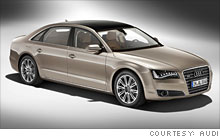Search News
FORTUNE -- Luxury models don't cost too much more to build than their mass market counterparts, though they do sell at much higher prices. Volkswagen AG is showing its grasp of this concept with the new Audi A8, VW's latest salvo in its quest to pass Toyota Motor Corp. as the world's top seller of automobiles.
The spectacular new $90,000 A8, available in U.S. showrooms in November, arguably positions Audi for the first time to compete head-to-head with BMW, Mercedes and Toyota's Lexus as a top world luxury brand, in terms of prestige as well as the prices paid by buyers. The A8's arrival precedes by less than a year the opening of VW's new Chattanooga, Tennessee assembly plant, where the German automaker will build a midsize sedan to compete with the Chevrolet Malibu, Toyota Camry and others in hopes of increasing its paltry U.S. market share.

With the revenue and prestige generated by luxury brands, automakers can expand their investment in less fancy vehicles, transferring features and technology to the masses as they become less costly to manufacture.
All of VW's moves these days, including Audi's A8 flagship and a U.S. assembly plant, are facets of a grand scheme to vault the automaker to No. 1 by 2018 from its current No. 2 or No. 3 status worldwide (depending on how sales are defined). Some analysts dismiss the goal as delusional, a ploy by Ferdnand Piech, VW's hard-driving chairman, to keep his troops motivated.
"We have VW growing significantly in the U.S., but to do so the brand is going to have to connect with younger buyers,'' said Rebecca Lindland, an analyst for IHS Global Insight in TK, Massachusetts. Could VW overtake Toyota? "Globally they're very strong, the potential in China, where Audi already is the top luxury brand, is almost unlimited."
VW's long road
But the U.S. represents the most important market where VW, already the leader in Europe, has underperformed. Until the past few years Audi was dogged in the U.S. by memories of unintended acceleration complaints in the late 1980s, largely unsubstantiated, though similar to the complaints that Toyota is fighting today.
Another reputational hurdle for VW still exists: According to the latest J.D. Power study, Audi and Volkswagen models have shown less than average reliability compared with other vehicles sold in the U.S. The brands have improved over the years, a J.D. Power spokesman said, but so had others, maintaining Audi and VW's position as below average.
Through September VW's Audi division sold nearly 74,000 vehicles in the U.S., a 23.6 percent improvement from the recessionary results of 2009. That was about half the total sold each by BMW, Mercedes and Lexus. Overall, VW including all its brands had a 3.1 percent share of the U.S. market, less than South Korea's Hyundai, which has been selling to Americans for about thirty fewer years.
VW's strategy for increasing share includes local manufacture in the UAW-unfriendly mid-south, which should help keep manufacturing costs low, and also a redesign of its vehicles to accommodate American tastes. The A8, loaded with adaptive radar and telematic technology that eventually will appear on less-expensive models, perhaps is most impressive in terms of fuel efficiency. On a 500-mile jaunt to northern Michigan from Detroit and back, it averaged a relatively thrifty 28 miles per gallon.
Another critical tactic for VW brands will be to improve their franchised dealer network. David Fischer, a dealer in the Detroit area, is spending "millions," he said, at VW's insistence to renovate his Farmington Hills, Michigan store. The new complex, which will house separate Audi, VW and Porsche showrooms, features heated sidewalks to facilitate snow removal and interior ceilings specially designed and manufactured in Germany. "VW and Audi want a certain look," Fischer said, "and we're happy to provide it. These showrooms will be more like pieces of art than buildings."
Toyota built its Lexus franchise largely upon exquisite customer service by dealers, a feat that few luxury automotive brands have been able to match. Beating Toyota just may require VW's Audi executives to surpass Lexus's retailing magic in a way few thought possible. ![]()






| Company | Price | Change | % Change |
|---|---|---|---|
| Ford Motor Co | 8.29 | 0.05 | 0.61% |
| Advanced Micro Devic... | 54.59 | 0.70 | 1.30% |
| Cisco Systems Inc | 47.49 | -2.44 | -4.89% |
| General Electric Co | 13.00 | -0.16 | -1.22% |
| Kraft Heinz Co | 27.84 | -2.20 | -7.32% |
| Index | Last | Change | % Change |
|---|---|---|---|
| Dow | 32,627.97 | -234.33 | -0.71% |
| Nasdaq | 13,215.24 | 99.07 | 0.76% |
| S&P 500 | 3,913.10 | -2.36 | -0.06% |
| Treasuries | 1.73 | 0.00 | 0.12% |
|
Bankrupt toy retailer tells bankruptcy court it is looking at possibly reviving the Toys 'R' Us and Babies 'R' Us brands. More |
Land O'Lakes CEO Beth Ford charts her career path, from her first job to becoming the first openly gay CEO at a Fortune 500 company in an interview with CNN's Boss Files. More |
Honda and General Motors are creating a new generation of fully autonomous vehicles. More |
In 1998, Ntsiki Biyela won a scholarship to study wine making. Now she's about to launch her own brand. More |
Whether you hedge inflation or look for a return that outpaces inflation, here's how to prepare. More |